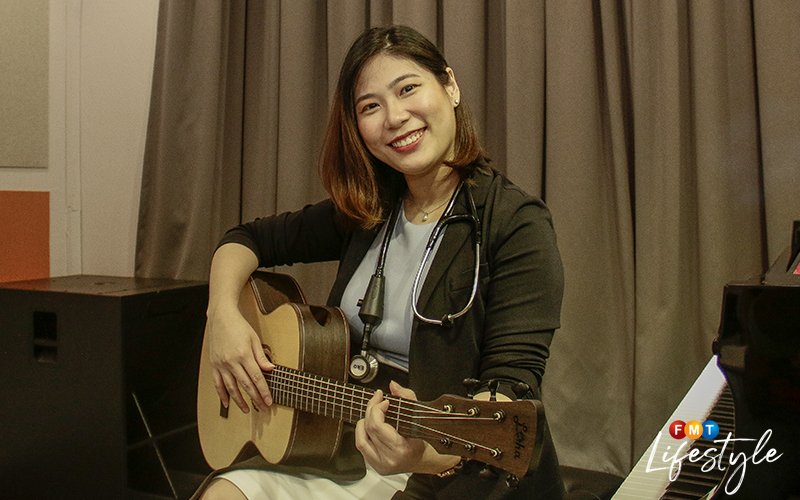KUALA LUMPUR: With a stethoscope hanging loosely around her neck, Sandra Cheah Mei Teng, 27, sits at a grand piano, strumming her guitar softly.
She could be mistaken for a doctor enjoying some timeout from her hectic shift but Sandra is actually one of only 15 registered music therapists in Malaysia.
And no, music therapy is not another phrase for music lessons, it is the use of music to address the specific needs of patients, be it physical, emotional, physiological, cognitive or social in nature.
Sandra primarily provides music therapy services to paediatric patients as well as end-of-life patients, all of whom have diverse medical, emotional and mental health needs.
The stethoscope hanging around her neck? It is no ordinary stethoscope but a digital stethoscope, used to record the heartbeat of her patients.
Once the recording is ready, it is edited, then looped as a base on which to compose music.
“If I have end-of-life cases, I engage in memory-making activities with the patient’s parents or family. This involves recording the patient’s heartbeat using my electronic stethoscope.
“Then I work with the family members by writing the song and placing the heartbeat within the song,” she tells FMT.
The heartbeat recording is especially emotional in nature because the song beomes personalised and it gives the family the sensation that the patient is still with them.
“If its elderly patients, I do the same thing but I add on therapeutic singing sessions with the family and we go through the patient’s life journey through their favourite songs, whether its songs they listened to at birth, during their teenage years or at their wedding.
“The songs help ignite important memories for both the family and the patient,” explains Sandra.
Sandra who also specialises in Neonatal Intensive Care Unit (NICU) music therapy explains that she works with mums and their premature babies.
“Many times, these babies suck very fast and they tend to choke. Premature infants do not know how to suck, swallow and breathe at the same time.”
In these instances, she talks to the mothers to understand what genre of music the baby was exposed to because by the third trimester, the baby’s auditory system is fully developed.
According to Sandra, there is a general misconception that babies respond best to baby songs but this is not true because babies actually lean towards what their parents listened to.
“Yes, lullabies do work because they have fewer melodies and it’s easier to remember but anything works, even metal music!”
“I take the lyrics and melody and slow it down. So, when the infants suck at a high rate, I slow the music down and they follow the music and suck slower.”
Among the more popular songs parents play for their babies are ‘You Are My Sunshine’, Jason Mraz’s ‘I’m Yours’, Elvis Presley’s ‘Love Me Tender’ and ‘Can’t Help Falling In Love.’
Sandra’s music instrument of choice might be the guitar but when working with patients who have suffered a stroke, she leans towards musical instruments such as drums and keyboards.
“Physiotherapists might have you working with a ball to improve your fine motor skills but I’d tell you to play your favourite song on the keyboard or even press the pedals of a drum.”
Despite working in a field that is not recognised by many Malaysians, Sandra has many patients who have greatly benefited from music therapy.
“While in the US, I had a 14-year-old patient who experienced a cardiac arrest and left cerebellum stroke that resulted in severe neurologic devastation. She was unable to communicate with anyone and basically even do anything,” recalls Sandra.
“I learnt the song of her favourite artist and played it at her bedside. Instantly, she began crying, communicating a cognitive awareness and association with the music. It showed that she was still very much present despite the stroke.”
As a music therapist, Sandra is a huge advocate of the importance of learning to play music.
She explains that numerous studies have shown that individuals who play music have a way bigger corpus callosum – the broad band of nerve fibres that connects the two hemispheres of the brain – than those who don’t play music.
“This part is responsible for the transfer of information from the left hemisphere to the right hemisphere,” she says, adding that studies also show there is a 60% lesser chance of contracting neurocognitive disorders such as dementia and Alzheimers among those who play a musical instrument.
Sandra says that although music therapy courses can be a tad costly and take up to five years to complete, there is a need for more music therapists in the country.
There is also the need to educate more people on the important role music plays in one’s day-to-day life. Rather than just being a form of entertainment or a beat to let loose and dance to, music is also therapeutic for the body, mind and soul, Sandra says.

